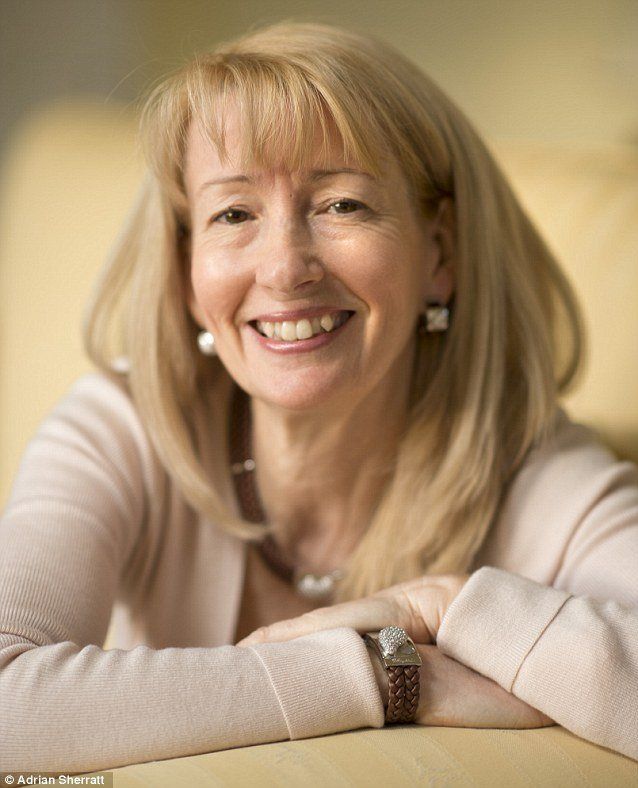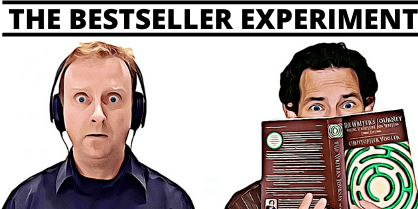EP38: From The Heart | Erica James

PODCAST
In this episode you will discover…
- Why it’s so important to write from the heart
- How talking to strangers can make you characters more interesting
- The importance of trusting your instincts
- How to know when your book isn’t working and how to fix it
Thanks for listening and joining us. Have some feedback you’d like to share? Leave a note in the comment section below.
SPREAD THE LOVE
If you enjoyed this episode, please share it using the social media buttons you see at the bottom of the post.
SUBSCRIBE, RATE & REVIEW ON ITUNES
Please do subscribe on iTunes and leave an honest review for The Bestseller Experiment Podcast on iTunes. Ratings and reviews are extremely helpful and greatly appreciated! They do matter in the rankings of the show, and we read each and every one of them. Don’t forget, when subscribing to the show on iTunes you will get automatic updates.
If you have any questions, you can contact us here.
Episode Highlights:
- Bestseller Experiment: Facebook | Twitter (@bestsellerxp) | Instagram | Pinterest
- Scrivener – Software for Writing
Links featured in today’s show:
- Bestseller Experiment’s Vault of Gold. Sign up to get your free Writer’s ebook
- Question Mark: Have a question you want answered on the show? Click here.
EPISODE TRANSCRIPT (HIGHLIGHTS)
We got emotional over tea and cake with Erica James. Erica is a bestselling author who has sold over 5 million copies of over twenty books, and she never fails to break readers’ hearts. We tried to discover how she does it…
How do you elicit an emotional reaction from a reader?
I do kill people off in my books quite a bit. Even characters that you’re not expecting to die. I think that’s been done quite well in a big series on the telly if I’m not mistaken? I haven’t been afraid to bump people off. Certainly, in my last book Song Of The Skylark, even I sobbed and sobbed and sobbed. I didn’t expect to feel that way.
Some authors say that unless they cry, they can’t expect their readers to cry. Do you think that’s true?
Oh, definitely. I’ve always said that I write from the heart, and I know that sounds a bit cheesy, but it’s true. If you’re only writing from your head, you’re not going to get that emotional depth. Readers have said to me that they think that I empathise with the characters that I create, and I think that’s true, and maybe that’s at the heart of what I do?
The heart has to be in the story, the characters, and the setting. As the writer you’ve got to love everything that you’re doing, even the bad characters.
Jimmy McGovern says his first draft comes from the head, and his second draft from the heart. Does that ring true?
That’s a good way of putting it. I think it’s a bit of both for me. When I’m doing the first draft I’m literally just throwing the story down. It doesn’t matter how many mistakes are in there, or how much I get wrong, or how many blanks I leave. There’s still the emotional content there as well. Although, with Song Of The Skylark I didn’t know how to end that one. I knew it had to have a sad-ish ending, and maybe it was because I was frightened to do that in this instance?
I wrote the first draft and left the ending. For the first time ever, I didn’t end it, because I didn’t know how to.
Then I went all the way back to chapter one to do the final draft and I waited and waited for inspiration to hit me, and I was very, very near the end when it came to me.
Was it just too difficult emotionally?
I knew what had to happen. I didn’t know how to do it properly. Recently I was in Norway doing an interview for the same book and the interviewer was asking some really perceptive comments about this character, Mrs. Dallimoor, who I absolutely loved, and this interviewer made me cry! He kept probing. Even afterwards I was still upset.
Was there a moment where you realised you could do this, or does it come naturally?
I think it comes naturally to me. Just empathising; putting myself in the shoes of the character. Also, I do cry quite easily over really silly things. I think I’m able to tap into emotions that I have. Maybe I didn’t realise I had them? An author once said to me that she could only write about happy things, because she didn’t want to put herself in a sad place. I think I naturally have a very big sad part to my character. I think I’ve experienced a number of very sad things in my life, one way or another. It’s being able to empathise, getting that emotion down on the page. Maybe some authors are better at it than others? In contrast, my books are not full of sex. I would much rather write about the emotional side of a relationship rather than the graphic side.
Your bio mentions how you used to embarrass your sons by talking to strangers in the street. You like to hear people’s stories. Does that inform you as a writer?
Yes, always. I’ve just been on holiday, constantly on the lookout for someone with a good story to write about. To say I’m a people person, does that sound a bit cheesy? I spend a lot of time on my own writing. It’s a solitary experience and I’m a very self-contained person, so I’m never lonely when I’m writing. But you can’t write in a vacuum, you have to come out and meet people. And being around people you just hear the most extraordinary things. A reader emailed me just this week with a mini life story. I wasn’t sure if it was something I would want to write about myself, but I’m always grateful when people want to share something with me.
You never know when it’s going to be useful and I am like the proverbial magpie: always on the lookout for something bright and shiny, and with tears attached to it.
I’m very judgemental. Instantly judgemental! I can tell whether something’s worth listening to or not, or whether I just glaze over. It’s channeling that emotion that you pick up from someone else. You’ve got to remember that ninety percent of what any author writes is from their imagination. I’m trying to think if I’ve ever taken, wholesale, someone else’s emotional situation. I don’t think I have. That might feel a bit weird.
What sort of person catches your eye?
You never know when that golden nugget is going to land in your lap, so you scoop it all up. Mostly it’s been subsidiary characters that I have gathered up. In one of my earlier books, The Holiday, I have a couple called Dolly Babe and Silent Bob and they were based on two characters who I practically stalked in the hotel where I was staying, because I was so fascinated by them. I couldn’t stop watching them. Silent Bob lay on a sun lounger all day with his laptop and a pipe in his mouth and a combover and his wife — I presume she was his wife — was rake-thin and never without a glass in her hand and wore this white swimsuit that had never been near any water. I had no idea what they were really like, but I decided what they were like and I used them in my book.
I always travel alone, so that’s very easy to eavesdrop on other people’s conversations.
I love the bickering that goes on amongst couples. You start filling in the blanks and you wonder what’s the glue that keeps them together.
If a scene isn’t working emotionally, what do you do to fix that?
I don’t think I’ve had that problem! Ah, little miss smug. It just comes from the heart. It’s either there or it isn’t. I’m able to bring something to it. It’s something that’s instinctive, it’s like asking me how do I breathe? I just do.
You’ve just delivered your new novel. What draft were you on before you decided it was ready for delivery?
I call it my final draft. It’s the second draft. I used to do three drafts, but now I’ve got it down to just the two.
The first draft is so rough. I would be so embarrassed if anyone saw it. No one would ever think that was the work of a proper writer.
Then, in what I see as the final draft, I’m fleshing the characters out, I’m polishing, just trying to get it as right as I possibly can. My editor has read it, and my agent, so now we’ve gone through that process, (editor) Harriet and I have been discussing the various points that she thinks I need to maybe add some more emotion to, or maybe even take some out. This is my twenty-first book, so I’ve been through this process enough times to be used to it. I will now go home and spend the next few weeks doing some rewrites, some of which will be very easy to do, some of which I will need to apply myself to and think how am I going to do that. Then it will go back to Harriet, and then it will go to the copy editor, and then I will look at it again, and then the final typesetters’ manuscript.
I treat each one as an opportunity to get it absolutely right. I have to say, by the end of that process I never want to see that book ever again for the rest of my life.
How long are you working on that?
This one has taken just over a year. I had a false start, which is a bit scary. I had written eleven chapters and just knew it wasn’t working. I was waking up each morning without a spring in my step. Just that nudge of fear that something wasn’t working. So I hit the delete button.
How do you know when it’s wrong?
It was an emotional response to it. I wasn’t feeling the love for the characters. I didn’t care about them. That told me all I needed to know.
You have to care about the characters on the page, they have to seem real, you have to care about what’s going to happen to them today, tomorrow, in a week’s time.
Their story has to matter to you. And those eleven chapters contained some characters that I didn’t care about. It was quite scary, and I hit the delete button and then told my editor. That meant it was time out of my work schedule. I’ve lost all that time and basically have to go back to the drawing board and start again.
Is there any remnant of that book in your new book?
There was just one character that I kept. But she turned out a little differently to how I thought she might be. I’ve had (false starts), but not on that scale. My book A Sense Of Belonging I had written the first two chapters, then woke up the next morning and though no, no, no, no, no. Who’s this character? Do I need this character? No, I don’t. So out the window she went. Ruthless. You have to be. You can’t be precious about it. When you start out, you think every word that you write is wonderful and then you soon realise… actually, no.
Of all the emotions you write about, is there one that touches readers most?
When I kill a character. Because I’ve made them care about that character, and then I’ve done the unspeakable thing. Sometimes it’s hard for me to let go. As a writer, you mustn’t be afraid to part with someone that you care about. Often I don’t realise myself that I’m going to kill these characters off. It comes as much of a surprise to me as it will to the reader. The way I write, I make it up as I go along.
I don’t have a synopsis, I don’t have a roadmap to follow. I set all the characters up, set the story rolling, and then this voice in my head says, ‘Kill them!’
We reach an age when we lose people and we know that it hurts to lose someone, whether it’s your parents or a friend, and once you’ve experienced that loss, or maybe it’s just a matter of having someone in your life that it would break your heart to lose them? You can relate to the emotions that the author is putting across.
Have you ever been asked to bring someone back from the dead in your books?
My agent said of Song Of The Skylark, ‘Ooh, there’s a high death rate in this book isn’t there?’ I said, it’s the second world war. What do you expect? Vulnerability is quite a key element. I didn’t realise that I did this, but after I’d written however many books I suddenly realised that I definitely had themes that I followed, and one was vulnerability. Having this very strong character, but then bringing them low.
Do you ever worry about repeating the same themes and ideas?
The fear of repeating oneself, yes, I live with that fear constantly. Various things crop up in my books again and again. Water, for instance. I had no idea I was doing this until maybe I’d written ten books. The sea will be there, or a lake, or a mere, or a pond, but one way or another water is there. I can only assume it’s because I grew up by the sea. I clearly have an affinity with water and it insinuates its way into my books. The new one has a very large lily pond in it.
Earlier books had the perfect couple who had it all… until… I took their son away, basically. Their two-year-old little boy. And that was a ploy. My agent said at the time, ‘Erica, why will the reader like this character, Allie, when she’s going to do this terrible thing within the novel?’ So I had to find a way to make the reader care about Allie, so by killing her child… I related more to her ex-husband’s emotional vulnerability to that. There’s something about a father losing his son. There’s just something there, I don’t even think I can put it into words. Poor Elliot was absolutely on his knees. He lost his son and then he loses his wife, because their marriage breaks down.
Readers assume that my viewpoint is the same as maybe the good characters, actually my viewpoint might chime more with the baddie! I’m actually getting my own nasty viewpoints across in a very subtle way. No one would ever dream that they could possibly be coming from my head.
You’re playing god with every book, really.
You’re creating this perfect world, then throwing this bomb into it and disrupting it, and then the rest of the novel is creating order out of the chaos.
I’m known for writing uplifting novels. I made the reader smile, maybe laugh a little, cry a little, be angry. Lots of emotions. But by the end of it they’re happy to have known those characters. The general feedback I get is that people enjoy spending time with the characters.
SHARE THE MEMES…
VIDEO TRAILER
SHARE THE PODCAST WITH A FRIEND
SUBSCRIBE TO THE BESTSELLER EXPERIMENT PODCAST!


